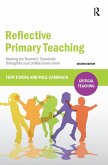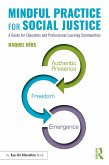Teaching As A Reflective Practice
The German Didaktik Tradition
Herausgeber: Westbury, Ian; Riquarts, Kurt; Hopmann, Stefan
Teaching As A Reflective Practice
The German Didaktik Tradition
Herausgeber: Westbury, Ian; Riquarts, Kurt; Hopmann, Stefan
- Gebundenes Buch
- Merkliste
- Auf die Merkliste
- Bewerten Bewerten
- Teilen
- Produkt teilen
- Produkterinnerung
- Produkterinnerung
An intro. to Didaktic (the heart of thinking about teaching/teacher educ in Germany) for English-speaking readers, drawing on a range of writings assoc. w/ this tradition. Throws light on assumptions, characteristics, & weaknesses of curriculum thought.
Andere Kunden interessierten sich auch für
![Reflective Practice in English Language Teaching Reflective Practice in English Language Teaching]() Steve MannReflective Practice in English Language Teaching182,99 €
Steve MannReflective Practice in English Language Teaching182,99 €![Reflective Primary Teaching Reflective Primary Teaching]() Tony EwensReflective Primary Teaching173,99 €
Tony EwensReflective Primary Teaching173,99 €![Mindful Practice for Social Justice Mindful Practice for Social Justice]() Raquel RíosMindful Practice for Social Justice116,99 €
Raquel RíosMindful Practice for Social Justice116,99 €![In Search of Responsibility as Education In Search of Responsibility as Education]() Hannah SpectorIn Search of Responsibility as Education164,99 €
Hannah SpectorIn Search of Responsibility as Education164,99 €![Place, Race, and Identity Formation Place, Race, and Identity Formation]() Ed Douglas McKnightPlace, Race, and Identity Formation183,99 €
Ed Douglas McKnightPlace, Race, and Identity Formation183,99 €![Curriculum and the Holocaust Curriculum and the Holocaust]() Marla MorrisCurriculum and the Holocaust183,99 €
Marla MorrisCurriculum and the Holocaust183,99 €![Fundamentals of Curriculum Fundamentals of Curriculum]() Decker F WalkerFundamentals of Curriculum183,99 €
Decker F WalkerFundamentals of Curriculum183,99 €-
-
-
An intro. to Didaktic (the heart of thinking about teaching/teacher educ in Germany) for English-speaking readers, drawing on a range of writings assoc. w/ this tradition. Throws light on assumptions, characteristics, & weaknesses of curriculum thought.<
Produktdetails
- Produktdetails
- Verlag: Taylor & Francis Ltd (Sales)
- Seitenzahl: 360
- Erscheinungstermin: 1. September 1999
- Englisch
- Abmessung: 234mm x 157mm x 28mm
- Gewicht: 721g
- ISBN-13: 9780805829204
- ISBN-10: 0805829202
- Artikelnr.: 22479144
- Herstellerkennzeichnung
- Libri GmbH
- Europaallee 1
- 36244 Bad Hersfeld
- gpsr@libri.de
- Verlag: Taylor & Francis Ltd (Sales)
- Seitenzahl: 360
- Erscheinungstermin: 1. September 1999
- Englisch
- Abmessung: 234mm x 157mm x 28mm
- Gewicht: 721g
- ISBN-13: 9780805829204
- ISBN-10: 0805829202
- Artikelnr.: 22479144
- Herstellerkennzeichnung
- Libri GmbH
- Europaallee 1
- 36244 Bad Hersfeld
- gpsr@libri.de
Westbury, Ian; Hopmann, Stefan; Riquarts, Kurt
Contents: Preface. S. Hopmann
K. Riquarts
Introduction: Starting a Dialogue: A Beginning Conversation Between Didaktik and the Curriculum Traditions. Part I: Didaktik as a Reflective Practice.I. Westbury
Teaching as a Reflective Practice: What Might Didaktik Teach Curriculum? R. Künzli
German Didaktik: Models of Re-presentation
of Intercourse
and of Experience. Part II: Bildung: Didaktik's Central Idea.W. von Humboldt
Theory of Bildung. C. Lüth
On Wilhel von Humbuoldt's Theory of Bildung. W. Klafki
The Significance of the Classical Theories of Bildung for a Contemporary Concept of Allgemeinbildung. Part III: Sources From the Didaktik Tradition.E. Weniger
Didaktik as a Theory of Education. H. Roth
The Art of Lesson Preparation. W. Klafki
Didaktik Analysis as the Core of Preparation of Instruction. M. Wagenschein
How to Teach Understanding: On the Concept of the Exemplary in Teaching. P. Menck
Content: Still in Question? Part IV: Didaktik as Praxis.S. Hopmann
Klafki's Model of Didaktik Analysis and Lesson Planning in Teacher Education. G.G. Hiller
Levels of Classroom Preparation. C. Senn-Fennell
Oral and Written Communication for Promoting Mathematical Understanding: Teaching Examples From Grade 3. M. Neubrand
Reflecting as a Didaktik Construction: Speaking About Mathematics in the Mathematics Classroom. A. Kirsch
Aspects of Simplification in Mathematics Teaching. M. Wagenschein
The Law of Free Fall as an "Exemplary Theme" for the Mathematicizablity of Certain Natural Processes. P. Reinhold
Open Experimenting: A Framework for Structuring Science Teaching and Learning. S. Gudmundsdottir
A. Reinertsen
N.P. Nordtømme
Klafki's Didaktik Analysis as a Conceptual Framework for Research on Teaching.
K. Riquarts
Introduction: Starting a Dialogue: A Beginning Conversation Between Didaktik and the Curriculum Traditions. Part I: Didaktik as a Reflective Practice.I. Westbury
Teaching as a Reflective Practice: What Might Didaktik Teach Curriculum? R. Künzli
German Didaktik: Models of Re-presentation
of Intercourse
and of Experience. Part II: Bildung: Didaktik's Central Idea.W. von Humboldt
Theory of Bildung. C. Lüth
On Wilhel von Humbuoldt's Theory of Bildung. W. Klafki
The Significance of the Classical Theories of Bildung for a Contemporary Concept of Allgemeinbildung. Part III: Sources From the Didaktik Tradition.E. Weniger
Didaktik as a Theory of Education. H. Roth
The Art of Lesson Preparation. W. Klafki
Didaktik Analysis as the Core of Preparation of Instruction. M. Wagenschein
How to Teach Understanding: On the Concept of the Exemplary in Teaching. P. Menck
Content: Still in Question? Part IV: Didaktik as Praxis.S. Hopmann
Klafki's Model of Didaktik Analysis and Lesson Planning in Teacher Education. G.G. Hiller
Levels of Classroom Preparation. C. Senn-Fennell
Oral and Written Communication for Promoting Mathematical Understanding: Teaching Examples From Grade 3. M. Neubrand
Reflecting as a Didaktik Construction: Speaking About Mathematics in the Mathematics Classroom. A. Kirsch
Aspects of Simplification in Mathematics Teaching. M. Wagenschein
The Law of Free Fall as an "Exemplary Theme" for the Mathematicizablity of Certain Natural Processes. P. Reinhold
Open Experimenting: A Framework for Structuring Science Teaching and Learning. S. Gudmundsdottir
A. Reinertsen
N.P. Nordtømme
Klafki's Didaktik Analysis as a Conceptual Framework for Research on Teaching.
Contents: Preface. S. Hopmann
K. Riquarts
Introduction: Starting a Dialogue: A Beginning Conversation Between Didaktik and the Curriculum Traditions. Part I: Didaktik as a Reflective Practice.I. Westbury
Teaching as a Reflective Practice: What Might Didaktik Teach Curriculum? R. Künzli
German Didaktik: Models of Re-presentation
of Intercourse
and of Experience. Part II: Bildung: Didaktik's Central Idea.W. von Humboldt
Theory of Bildung. C. Lüth
On Wilhel von Humbuoldt's Theory of Bildung. W. Klafki
The Significance of the Classical Theories of Bildung for a Contemporary Concept of Allgemeinbildung. Part III: Sources From the Didaktik Tradition.E. Weniger
Didaktik as a Theory of Education. H. Roth
The Art of Lesson Preparation. W. Klafki
Didaktik Analysis as the Core of Preparation of Instruction. M. Wagenschein
How to Teach Understanding: On the Concept of the Exemplary in Teaching. P. Menck
Content: Still in Question? Part IV: Didaktik as Praxis.S. Hopmann
Klafki's Model of Didaktik Analysis and Lesson Planning in Teacher Education. G.G. Hiller
Levels of Classroom Preparation. C. Senn-Fennell
Oral and Written Communication for Promoting Mathematical Understanding: Teaching Examples From Grade 3. M. Neubrand
Reflecting as a Didaktik Construction: Speaking About Mathematics in the Mathematics Classroom. A. Kirsch
Aspects of Simplification in Mathematics Teaching. M. Wagenschein
The Law of Free Fall as an "Exemplary Theme" for the Mathematicizablity of Certain Natural Processes. P. Reinhold
Open Experimenting: A Framework for Structuring Science Teaching and Learning. S. Gudmundsdottir
A. Reinertsen
N.P. Nordtømme
Klafki's Didaktik Analysis as a Conceptual Framework for Research on Teaching.
K. Riquarts
Introduction: Starting a Dialogue: A Beginning Conversation Between Didaktik and the Curriculum Traditions. Part I: Didaktik as a Reflective Practice.I. Westbury
Teaching as a Reflective Practice: What Might Didaktik Teach Curriculum? R. Künzli
German Didaktik: Models of Re-presentation
of Intercourse
and of Experience. Part II: Bildung: Didaktik's Central Idea.W. von Humboldt
Theory of Bildung. C. Lüth
On Wilhel von Humbuoldt's Theory of Bildung. W. Klafki
The Significance of the Classical Theories of Bildung for a Contemporary Concept of Allgemeinbildung. Part III: Sources From the Didaktik Tradition.E. Weniger
Didaktik as a Theory of Education. H. Roth
The Art of Lesson Preparation. W. Klafki
Didaktik Analysis as the Core of Preparation of Instruction. M. Wagenschein
How to Teach Understanding: On the Concept of the Exemplary in Teaching. P. Menck
Content: Still in Question? Part IV: Didaktik as Praxis.S. Hopmann
Klafki's Model of Didaktik Analysis and Lesson Planning in Teacher Education. G.G. Hiller
Levels of Classroom Preparation. C. Senn-Fennell
Oral and Written Communication for Promoting Mathematical Understanding: Teaching Examples From Grade 3. M. Neubrand
Reflecting as a Didaktik Construction: Speaking About Mathematics in the Mathematics Classroom. A. Kirsch
Aspects of Simplification in Mathematics Teaching. M. Wagenschein
The Law of Free Fall as an "Exemplary Theme" for the Mathematicizablity of Certain Natural Processes. P. Reinhold
Open Experimenting: A Framework for Structuring Science Teaching and Learning. S. Gudmundsdottir
A. Reinertsen
N.P. Nordtømme
Klafki's Didaktik Analysis as a Conceptual Framework for Research on Teaching.








